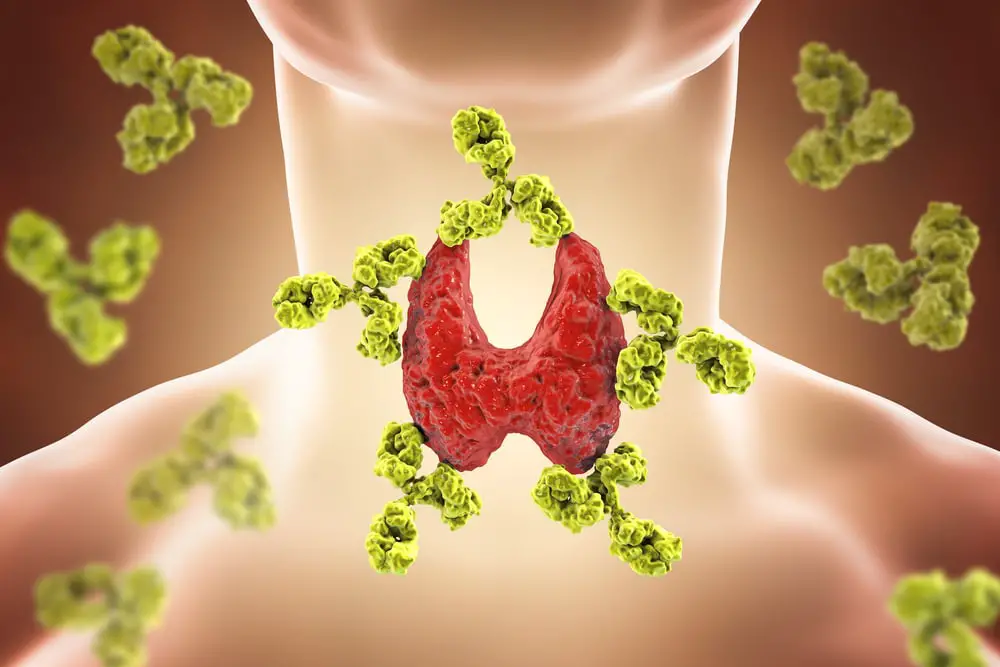If you are experiencing weight gain, digestive problems, fatigue, dry skin, muscle pain, and other mysterious symptoms, you may be one of over 10 million Americans suffering from hypothyroidism. Though this condition can occur in both men and women, a higher percentage of women are diagnosed with it every year. It is estimated that 1 in every 10 women are suffering from some sort of thyroid hormone deficiency, even if they don’t know it. With the thyroid being such an important gland in the body, any sort of disorder involving it can have frustrating or sometimes dangerous side effects. If you believe you have a thyroid-related condition, it is important you work with a trusted medical professional or an endocrine specialist to get to the bottom of your symptoms.
In this article, you will learn about hypothyroidism, the diagnosing process, possible treatments and other frequently asked questions regarding this disease.
What is Hypothyroidism?
Your thyroid gland is a butterfly-shaped organ located at the base on your neck and is part of your hard-working endocrine system. When most people think of the thyroid, they think about metabolism and weight loss/weight gain. While the thyroid is certainly a major contributor to metabolism, it also plays a big role in other bodily functions as well. It releases hormones, regulates vital functions such as your heart rate and breathing, supports muscle strength, impacts your menstrual cycle, helps to regulate body temperature, supports the nervous system, and more.
The thyroid operates with the assistance of many different thyroid-based hormones. When these hormones are not being made properly OR the body is not able to absorb and utilize them, hypothyroidism (slow thyroid) develops. When this happens, many thyroid-supported functions begin to slow down which can lead to symptoms such as decreased metabolism, weight gain, energy production, mood swings, memory loss, irritability, abnormal menstrual cycles, decreased libido, etc. (1, 2)
Can Hypothyroidism Be Cured/Reversed?
There are many effective treatment options for hypothyroidism which can help to restore normal function of the thyroid. Whether or not it can be completely cured depends on what the cause of the condition was in the first place. A slow thyroid is often caused by underlying chronic conditions such as Hashimoto’s disease, which is a condition that can be managed but not “cured”. However, other causes of hypothyroidism may be temporary, such as post-partum thyroiditis and subacute thyroiditis. With these conditions, once they are treated, the symptoms of hypothyroidism should go be resolved.
Can Hypothyroidism Symptoms Come and Go?
Once hypothyroidism sets in, symptoms generally worsen over time if not treated. With proper treatment and lifestyle adjustments, symptoms can improve greatly. The feeling of “come and go” with symptoms may occur if one is not consistent with taking their medications, eating a balanced diet, exercising and/or participating in other recommended activities to improve health and quality of life.
Hypothyroidism vs Hyperthyroidism
In hypothyroidism, one experiences a dramatic decrease in hormone production/utilization. In hyperthyroidism, more hormones than normal are produced and used throughout the body. Therefore, the symptoms of each condition are nearly opposite. With hypothyroidism, you will experience fatigue, weight gain, mood swings, depression, low libido, etc. With hyperthyroidism, you may experience weight loss, anxiety, and a racing heart, amongst other symptoms.
Symptoms of Hypothyroidism
Hypothyroidism often develops slowly. You may not experience all symptoms. Symptoms may vary and may not always be obvious. If you feel something is off, trust your body. Speak with a medical professional who can help you determine if your symptoms may be due to a thyroid disorder. (3)
The following may be symptoms of hypothyroidism:
- fatigue
- weight gain
- constipation
- cold intolerance
- slowed movements, and speech
- joint and muscle pain, cramps, and weakness
- dry skin
- thin, brittle hair or fingernails
- decreased sweating
- weakness
- puffy face, feet, and hands
- insomnia
- balance and coordination issues
- loss of libido
- recurrent urinary and respiratory tract infections
- hoarseness
- puffiness in the face
- thinned or missing eyebrows
- slow heart rate
I recommend keeping a symptom journal. If you begin to notice symptoms such as the ones outlined above, write them down. When did they start? How often are you noticing them? The more prepared you are when you go to your doctor, the better he or she will be able to assist you in decoding your symptoms and making a treatment plan.
Who Is Most At Risk For Hypothyroidism?
Anyone can develop hypothyroidism, but there are certain individuals who may be more at risk. You are more likely to develop a thyroid disorder if you fall under one or more of the following categories:
- A history of autoimmune disease. A recent study found that 1 in 6 hypothyroidism patients also had another autoimmune disease. The most common being atrophic gastritis, vitiligo, celiac disease, antiphospholipid syndrome, type 1 diabetes, and multiple sclerosis. (13)
- Previous radiation treatment to the head or neck. A common side effect of receiving radiation treatment to the head or neck is a disease in the thyroid gland. If you’ve had radiation done to these areas in the past, keeping tabs on your thyroid health is very important. Studies have found that thyroid symptoms may occur even years after radiation treatment was received. (14)
- A family history of thyroid problems. Genetics can play a major role in thyroid development and function. A family history of thyroid disorders may mean you are more susceptible to developing hypothyroidism.
- Being female. On average, 1 in 8 women will develop thyroid disease in their lifetime. The likelihood increases with age, especially post-menopause.
- Pregnancy. Women are at risk of developing postpartum thyroiditis if they have had a child in the last year. Symptoms last several months, but are generally not chronic.
- Low iodine intake. Iodine is very important to the function of the thyroid and its ability to produce hormones. Not getting enough iodine can lead to hypothyroidism, while consuming too much can lead to hyperthyroidism.
Diagnosing Hypothyroidism
A health history, physical examination, and understanding your symptoms is the first step to diagnosis. If your doctor suspects that you may have hypothyroidism, they will order blood tests for your TSH levels and T3, T4, and thyroid autoantibody testing for definite diagnosis.
TSH Testing
A slow thyroid is a result of low thyroid hormones, known as T3 and T4. These are produced in the thyroid gland. A hormone called TSH (thyroid-stimulating hormone) is produced in the pituitary gland and alerts the thyroid gland to release T3 and T4. TSH is essential for proper thyroid functioning.
Remember that everyone is unique. These numbers may not be accurate representations for everyone. While a TSH test is generally the first test a doctor will run, it is not definitive. Even if your levels of TSH are normal, if symptoms are present, there could still be something wrong with your thyroid.
T4 Testing
A T4 test measures the amount of the thyroid hormone T4 in your bloodstream. If you have a low level of T4, that is a sign the thyroid is not producing hormones properly. Sometimes a person may have high levels of TSH and low levels of T4. This is because the pituitary gland can sense the thyroid isn’t producing adequate hormones and sends off more TSH to try and help stimulate the thyroid. But if the thyroid isn’t operating properly, it will still produce low levels of thyroid hormone.
Anti-thyroid Microsomal Antibodies Testing
A third test to diagnose or rule out hypothyroidism is an anti-thyroid microsomal antibodies test. These antibodies may be present if you have an underlying autoimmune disease that is triggering the body to attack your thyroid.
Conventional Treatment For A Slow Thyroid
Synthetic thyroxine
Medical treatment tends to focus on supplementing the thyroid hormone. Your doctor will likely prescribe synthetic thyroxine, a medication that is identical to your T4 hormone.
Iodine
Iodine is an essential mineral for iodine function. Deficiency can lead to goiter. It is important to supplement with iodine only under your doctor’s advice and supervision, as many people, especially with autoimmune thyroid diseases are sensitive to iodine. It is important to only take it if your body needs it, and only take a prescribed dose. (4, 5)
Other supplements
Zinc, selenium, vitamin D, and probiotics may also beneficial for those with hypothyroidism. Always talk to your doctor to make sure these supplements are right for you. (6, 7, 12)
I recommend my patients dealing with thyroid issues take my Thyroid Support. Thyroid Support is a comprehensive formulation that provides a blend of nutrients and botanicals working in synergy to support thyroid health. Thyroid Support includes L-tyrosine and iodine, which make up the backbone of the thyroid hormones thyroxine (T4) and triiodothyronine (T3). The addition of zinc, selenium, vitamin A, and the botanical guggulipid activate enzymes that enhance the conversion of T4 into the active thyroid hormone T3. Vitamin A and zinc also help improve cellular sensitivity to thyroid hormones. Turmeric, along with the antioxidants vitamin C and E and N-acetyl cysteine (NAC), provide a powerful combination of antioxidants that boost thyroid health by reducing free radical stress and supports healthy thyroid function. My Thyroid Support alongside a healthy wholefood diet and exercise can help stabilize the thyroid and give you back the balance you are craving in your life.

Natural Treatments For A Slow Thyroid
Hypothyroidism will require regular medication in order to manage the symptoms and prevent complications from arising, but that doesn’t mean there’s nothing you can do in addition to the medication. There are several natural treatments that you can take alongside the prescription medication to help alleviate your symptoms.
Eating a nutrient-rich whole foods diet is important for maintaining optimum health. Avoid highly processed foods, refined sugar, cruciferous vegetables, soy, gluten, alcohol, and coffee. Eat plenty of greens, vegetables, fruits, gluten-free grains, nuts, seeds, eggs, fish, and meat. Choose organic whenever possible. (5, 8, 9)
Fish oils
Fish oils are critical for brain and thyroid function, and so taking a fish oil supplement daily can help with the symptoms of hypothyroidism, although it cannot cure the condition itself. Omega-3 fish oil supplements are associated with a lower risk of thyroid symptoms.
Exercise
Exercise is a great way to manage stress, has been linked to decreased depression and is generally fantastic for your overall health. As weight gain is often one of the first indicators of hypothyroidism, exercise can help reverse that symptom and often improves your overall mood. It can also help with the sluggishness associated with hypothyroidism.
Foods Rich in Antioxidants
It’s commonly known that foods laden with antioxidants are good for you, but if you have hypothyroidism it’s even more important you get as many of them in your daily diet as possible. Oxidative stress is a state of increased inflammation associated with hypothyroidism and antioxidants help battle that, keeping you in the best shape possible.
Which Foods To Limit/Avoid If You Have Hypothyroidism
There are a few things that can aggravate symptoms of hypothyroidism and therefore should be avoided whenever possible.
Soy
Although you don’t need to completely cut soy out of your diet, be very mindful of when you consume it, as it can interfere with your body’s ability to absorb the medication most commonly prescribed for hypothyroidism. In fact, the Mayo Clinic recommends that you wait four hours after taking thyroid medication to consume any products that contain soy.
Coffee
Studies suggest that there is a link between coffee and the inability to absorb medicine required for hypothyroidism so it’s important to make sure you leave enough time between taking your medicine and consuming coffee.
Antacids Containing Calcium
You should avoid these for the same reason you should avoid soy and coffee. The calcium in these antacids can affect the absorption of the hypothyroid medication and again these should be taken at least four hours after your medication.
Hypothyroidism is a common thyroid condition that comes with many symptoms, including weight gain, dry skin, fatigue, and muscle pain. If you have hypothyroidism, proper treatment, including supplementation and nutrition, can greatly improve your condition.

My Personal RX:
Based on the information we’ve discussed in this article, here are my recommendations for managing and optimizing your health if you’re dealing with hypothyroidism:
- Download a Free Copy of My Protocol to Optimizing your Health and Wellbeing: This 50-page guide offers step-by-step instructions to help you improve your overall health. It’s a valuable resource that can complement your hypothyroidism management plan.
- Try Thyroid Support Supplement: This scientifically-backed supplement is specially designed to support thyroid function. The blend of nutrients and botanicals works synergistically to enhance thyroid health.
- Join the MasterClass: This comprehensive Master Class covers the 5 pillars of health and gives you practical strategies to regain your health. This is an opportunity to immerse yourself in a community where you’ll get the support and education you need to take control of your health.
- Implement a Healthy Diet: Eating nutrient-rich whole foods and avoiding processed foods can have a significant impact on your thyroid health. Make sure to include a good balance of vegetables, fruits, gluten-free grains, nuts, seeds, eggs, fish, and meat in your diet.
- Exercise Regularly: Regular physical activity can help manage weight gain, improve mood, and reduce sluggishness – common symptoms associated with hypothyroidism.
- Limit Certain Foods and Substances: If you’re taking hypothyroidism medication, be mindful of substances like soy, coffee, and antacids containing calcium as they can interfere with your medication absorption.
- Monitor Your Symptoms: Keeping a symptom journal can be very helpful in managing your condition. Document when symptoms start and how often you notice them. This information can assist your healthcare provider in understanding and managing your symptoms.
Remember, managing hypothyroidism is a journey that requires a combination of medical treatment, lifestyle modifications, and a supportive healthcare team. These recommendations are designed to help you live a healthier life despite the challenges posed by hypothyroidism. As always, consult with your healthcare provider before making any major changes to your health regimen.

References:
- https://www.niddk.nih.gov/health-information/endocrine-diseases/hypothyroidism
- https://medlineplus.gov/hormones.html
- http://www.thyroiduk.org.uk/tuk/about_the_thyroid/hypothyroidism_signs_symptoms.html
- http://americannutritionassociation.org/newsletter/hypothyroidism
- https://www.ncbi.nlm.nih.gov/pmc/articles/PMC4383497/
- https://www.ncbi.nlm.nih.gov/pmc/articles/PMC5307254/
- https://www.karger.com/Article/Abstract/103324
- https://www.ncbi.nlm.nih.gov/pmc/articles/PMC3743356/
- https://www.todaysdietitian.com/newarchives/070112p40.shtml
- https://www.ncbi.nlm.nih.gov/pmc/articles/PMC2111403/
- https://www.niddk.nih.gov/health-information/endocrine-diseases/hashimotos-disease
- https://www.ncbi.nlm.nih.gov/pmc/articles/PMC4056127/
- http://www.medscape.com/viewarticle/763855
- https://patienteducation.osumc.edu/Documents/Long-TermSideEffectsHNRadiation.pdf




















